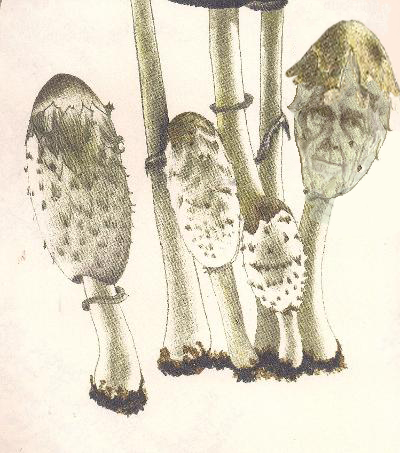John Cage’s forgotten love – the humble mushroom
The dizzying output of John Cage the musician, the poet, the writer, the thinker, the artist, was so prolific that one of his sidelines – his interests in wild mushrooms -- has been almost overlooked. A new a two-volume set of books, beautifully designed by Capucine Labarthe, packaged in an elegant slipcover, seeks to fill this gap.
A Mycological Foray tells the story of Cage’s mushroom knowledge, where it came from, what it meant to him and how he lived his dream in the forests of the U.S. East Coast. It is paired with Mushroom Book, a downscaled reprint of the 1972 lithographs of mushroom drawings by the late artist Lois Long, a Cage collaborator. These books are a foray in their own right, delving into little-known woodlands territory. (Mycology is a branch of botany dealing with fungi of all sorts.)
Deftly assembled by writer Kingston Trinder and published by Atelier Editions, it is the most accessible collection of Cage’s mushroom lore to date.
Trinder has mined the many Cage books and articles for references to his mushroom interests and created a readable seven-chapter essay punctuated by relevant “Indeterminacies” and diary excerpts. As a bonus, the book includes the complete 78-page poem “Mushrooms and Variationes”, and dozens of previously unpublished photos of Cage squatting among the fungi.
Cage reading his hour-long epic poem can be enjoyed here:
But don’t expect to follow it line by line. Cage said it was not meant to be understood “in the conventional sense”. In fact, I found it to be vintage Cage, words arranged at random on the page and performed in a mesmerizing monotone. He loved randomness in all spheres of life.
The companion collection of Mushroom Book offers Cage in full flow, scribbling thoughts on the page, overwriting paragraphs so heavily as to become illegible. But the ten lithographs, reproduced in full color, are stunningly beautiful, perfectly suitable for framing if you happen to love mushrooms. Each is protected by a sheet of rare Japanese translucent paper.
Cage was serious about his sideline, even consuming a poisonous mushroom as an experiment, ending up hospitalized to have his stomach pumped. Best known to the casual music-lover for his unplayed piano piece “4’33”, he recalls that he spent “many pleasant hours in the woods conducting the performances of my silent piece.” His solitary concertizing was “much longer than the popular length.” Exactly how much longer he does not tell us.
The most interesting Cage text in the book is his opening essay, “Music Lovers’ Field Companion”. The book begins with his claim that music and mushrooms shared a place in his mind. “I have come to the conclusion,” he writes, “that much can be learned about music by devoting oneself to the mushroom.”
He goes on: “As a demanding gourmet sees but does not purchase the marketed mushroom, so a lively musician reads from time to time the announcements of concerts and stays quietly at home.” A tentative connection at best.
Trinder notes that “speculation abounds” as to whether Cage first became smitten by the mushroom during his time at Black Mountain College in Asheville, North Carolina, in the late 1940s where he wandered among the meadowlands and riverine valleys nearby. Cage never quite explained how it all started.

Later, back in New York, he resurrected the dormant New York Mycological Society for sharing his expertise. It is still going strong, arguably an important part of his legacy.
Cage the well-known composer knew he might be considered out of his mind for his mushroom sideline and added, “Lest I be thought frivolous and light-hearted and, worse, an ‘impurist’ for having brought about the marriage of the agaric (a family of fungi) with Europe, observe that composers are continually mixing up music with something else.” He cites Stockhausen as being interested in music and juggling, and his friend the late Pierre Boulez in the interaction of music with printed parentheses and italics.
“I prefer my own choice of mushrooms, he concludes. “Furthermore, it is avant-garde.”
Trinder relied on his editor in chief, Pascale Georgiev, to serve as creative director of the two-year project. Key to maintaining accuracy of Cage’s often rambling texts were Laura Kuhn and Emy Martin of the John Cage Trust at Bard College.
This article is brought to you by the author who owns the copyright to the text.
Should you want to support the author’s creative work you can use the PayPal “Donate” button below.
Your donation is a transaction between you and the author. The proceeds go directly to the author’s PayPal account in full less PayPal’s commission.
Facts & Arts neither receives information about you, nor of your donation, nor does Facts & Arts receive a commission.
Facts & Arts does not pay the author, nor takes paid by the author, for the posting of the author's material on Facts & Arts. Facts & Arts finances its operations by selling advertising space.

